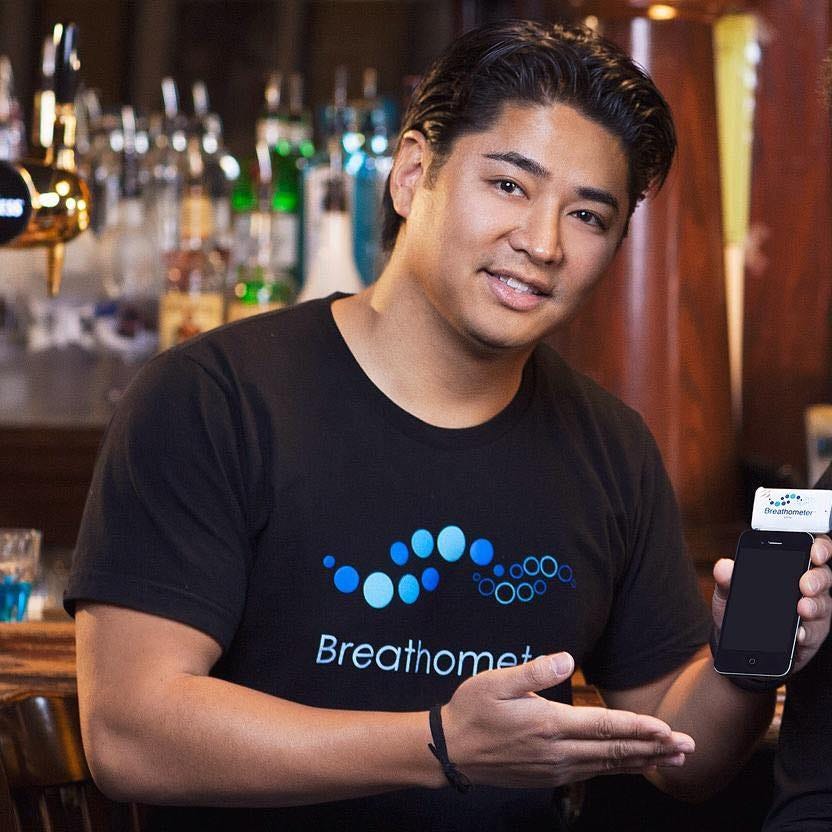5 Key Lessons from Breathometer – The Startup Backed by All Sharks
A Game-Changing Pitch on Shark Tank
Continuing our Shark Tank & Beyond series after covering Pavlok and Scrub Daddy, today we dive into the fascinating journey of Breathometer. This startup’s story is packed with lessons for every entrepreneur. Let’s get started.
A Game-Changing Pitch on Shark Tank
In 2013, an idea took the Shark Tank stage and immediately turned heads: Breathometer. This tiny device transformed smartphones into personal breathalyzers. Picture this—you’re at a wedding or a party, wondering, How many drinks did I have? Instead of guessing, this sleek and modern device provided an instant solution. Entrepreneur Charles Michael Yim took the stage with this brilliant idea, instantly capturing everyone's attention.
A Charismatic Entrance and a Groundbreaking Presentation
Charles commanded the room the moment he stepped onto the stage. He asked for $250,000 in exchange for 10% equity (a $2.5 million valuation). From the start, he was a showman—he even served champagne to the investors before asking. But what happens next? How will you get home safely? The message was clear: Breathometer solved an important problem.
Why was Breathometer such a breakthrough? It was pocket-sized, plugged into a smartphone’s headphone jack, and delivered blood alcohol level readings within seconds. The app even estimated the time needed to sober up and could call a cab with a single tap. Charles presented these features with contagious enthusiasm.
A Historic Shark Tank Moment: Five Investors Jump In
Charles' pitch was so compelling that something unprecedented happened: all five sharks made an offer!
Mark Cuban alone proposed $500,000 for 15% equity, while Lori Greiner, Robert Herjavec, Daymond John, and Kevin O’Leary teamed up to offer the remaining $500,000 for another 15%. Champagne popped in celebration of this historic deal—one of the rare moments where all investors joined forces to back a single company.
This was the golden moment! Five seasoned investors believing in the same idea spoke volumes about its potential. Charles hit the jackpot, securing five sharks in one deal.
The Rise: New Products and Expanding Vision
Following the investment, Breathometer kept gaining momentum. As revealed in Beyond the Tank, the company generated $4.2 million in revenue that year. Everything seemed to be going according to plan.
Charles introduced an upgraded version called Breeze, which was Bluetooth-enabled and developed with research from the Cleveland Clinic’s breath analysis labs. The device hit major retail stores like Best Buy and Brookstone. The company’s vision was even broader: expanding breath analysis beyond alcohol detection and into healthcare applications.
It was an exciting growth phase—investment secured, sales rising, and new products launching. But in entrepreneurship, rapid growth requires caution. Soon, things started to take a turn.
The Unexpected Fall: FTC Investigation
Unfortunately, the story didn’t have a fairy-tale ending. In 2017, the Federal Trade Commission (FTC) stepped in, stating that Breathometer provided “significantly inaccurate” results.
Investigations revealed that the product’s accuracy claims were misleading and that it often underestimated blood alcohol levels. Marketing messages like “Lab-tested at government standards” and “Breeze is law-enforcement grade” were proven false. Even worse, the company knew about these issues but failed to inform customers, continuing to make deceptive claims.
This wasn’t just a business problem—it was a serious public safety issue. Incorrect blood alcohol readings could lead to life-threatening decisions about driving.
Loss of Reputation and Refund Obligation
With the FTC's decision, Breathometer was required to issue full refunds to its customers. The app was removed from stores, and the company suffered a significant loss of reputation.
The $5.1 million revenue generated from the Original and Breeze models turned into a major loss after the company committed to reimbursing customers to the FTC.
Mark Cuban’s Criticism
Mark Cuban stated that Charles was spending money on trips to Hawaii and Bora Bora, as seen in his Instagram Stories, and accused him of mismanaging resources. He called Breathometer "the worst investment in Shark Tank history.
A New Direction: Pivoting to Oral Health
Refusing to give up, Breathometer pivoted into a different market: oral health. Their new device, Mint, aimed to detect sulfur compounds linked to bad breath and gum disease. They even partnered with Philips to further their research.
Pivoting is a crucial skill in entrepreneurship. The oral health market was promising, and this shift seemed like a smart move. Perhaps this time, they could make a comeback…
The Final Chapter: Mint’s Quiet Exit
However, Mint failed to gain traction. By 2021, it disappeared from both the company’s website and platforms like Amazon. As of 2023, the product is no longer available. Charles Yim later claimed that Breathometer was acquired, but no verifiable evidence supports this claim.
Key Lessons from Breathometer’s Journey
Despite its promising start, Breathometer ultimately became a cautionary tale in entrepreneurship. Its story reminds us that big ideas and major investments alone aren’t enough for success. Here are five crucial takeaways:
Integrity is Everything
Your product must deliver on its promises. Breathometer’s downfall began when its accuracy was questioned. In industries affecting public health and safety, honesty is non-negotiable.Transparency & Honesty Build Trust
The company knew about the product flaws but didn’t disclose them. Owning up to mistakes and addressing them proactively can prevent irreversible damage. Investors, customers, and regulators all value transparency.Quality Beats Hype
Bold claims attract attention, but without a solid product, it all falls apart. Good products speak for themselves—marketing can’t compensate for a lack of reliability.Smart Resource Management is Critical
Mark Cuban’s “mismanagement” remarks highlight an important lesson: reckless spending can sink even the most promising startups. Investments should focus on product development and sustainability.Pivoting Isn’t Enough—You Need the Right Pivot
Shifting to oral health was innovative, but execution matters. A pivot should be based on strong market research, customer demand, and a viable business strategy.
Final Thoughts
The Breathometer story is both inspiring and cautionary. It started with an electrifying pitch, made Shark Tank history, and showed how innovation can attract major investments. But ultimately, product integrity and responsible leadership determine long-term success.
What are your thoughts on this rise-and-fall journey? Let’s discuss in the comments!







